
莲喇母矮降贸多大学 高级商务英语阅读 Supplementary Reading for Chapter 11 Is Globalization Slowing Down? Globalization Can and Must Change February 24,2004 Globalization can and must change,says a new,groundbreaking report presented today to the International Labour Organization (ILO)urging that building a fair and inclusive globalization become a worldwide priority.A Fair Globalization(Creating Opportunities for All)calls for an"urgent rethink"of current policies and institutions of global governance. The report acknowledges that globalization's "potential for good is immense"and that it "has opened the door to many benefits,promoted open societies and open economies and encouraged a freer exchange of goods,ideas and knowledge.A truly global conscience is beginning to emerge sensitive to the inequities of poverty,gender discrimination,child labour and environmental degradation."Nevertheless,it says,"There are deep-seated and persistent imbalances in the current workings of the global economy,which are ethically unacceptable and politically unsustainable.Seen through the eyes of the vast majority of men and women,globalization has not met their simple and legitimate aspirations for decent jobs and a better future for their children". "There is growing concern about the direction globalization is currently taking",says the report."Its advantages are too distant for too many,while its risks are all too real.Corruption is widespread. Open societies are threatened by global terrorism,and the future of open markets is increasingly in question.Global govemnance is in crisis.We are at a critical juncture,and we need to urgently rethink our current policies and institutions." The report"offers no miraculous or simple solutions,for there are none.But it is an attempt to help break the current impasse by focusing on the concerns and aspirations of people and on the ways to better harness the potential of globalization itself". Among its prescriptions for achieving a fair and inclusive globalization,it proposes a series of coordinated measures across a broad front to improve governance and accountability at both 第1页共9页
高级商务英语阅读 Supplementary Reading for Chapter 11 Is Globalization Slowing Down? Globalization Can and Must Change February 24, 2004 Globalization can and must change, says a new, groundbreaking report presented today to the International Labour Organization (ILO) urging that building a fair and inclusive globalization become a worldwide priority. A Fair Globalization(Creating Opportunities for All) calls for an "urgent rethink" of current policies and institutions of global governance. The report acknowledges that globalization's "potential for good is immense" and that it “has opened the door to many benefits, promoted open societies and open economies and encouraged a freer exchange of goods, ideas and knowledge.A truly global conscience is beginning to emerge sensitive to the inequities of poverty, gender discrimination, child labour and environmental degradation.” Nevertheless, it says, "There are deep-seated and persistent imbalances in the current workings of the global economy, which are ethically unacceptable and politically unsustainable. Seen through the eyes of the vast majority of men and women, globalization has not met their simple and legitimate aspirations for decent jobs and a better future for their children". "There is growing concern about the direction globalization is currently taking", says the report. "Its advantages are too distant for too many, while its risks are all too real. Corruption is widespread. Open societies are threatened by global terrorism, and the future of open markets is increasingly in question. Global governance is in crisis. We are at a critical juncture, and we need to urgently rethink our current policies and institutions." The report "offers no miraculous or simple solutions, for there are none. But it is an attempt to help break the current impasse by focusing on the concerns and aspirations of people and on the ways to better harness the potential of globalization itself". Among its prescriptions for achieving a fair and inclusive globalization, it proposes a series of coordinated measures across a broad front to improve governance and accountability at both 第 1 页 共 9 页
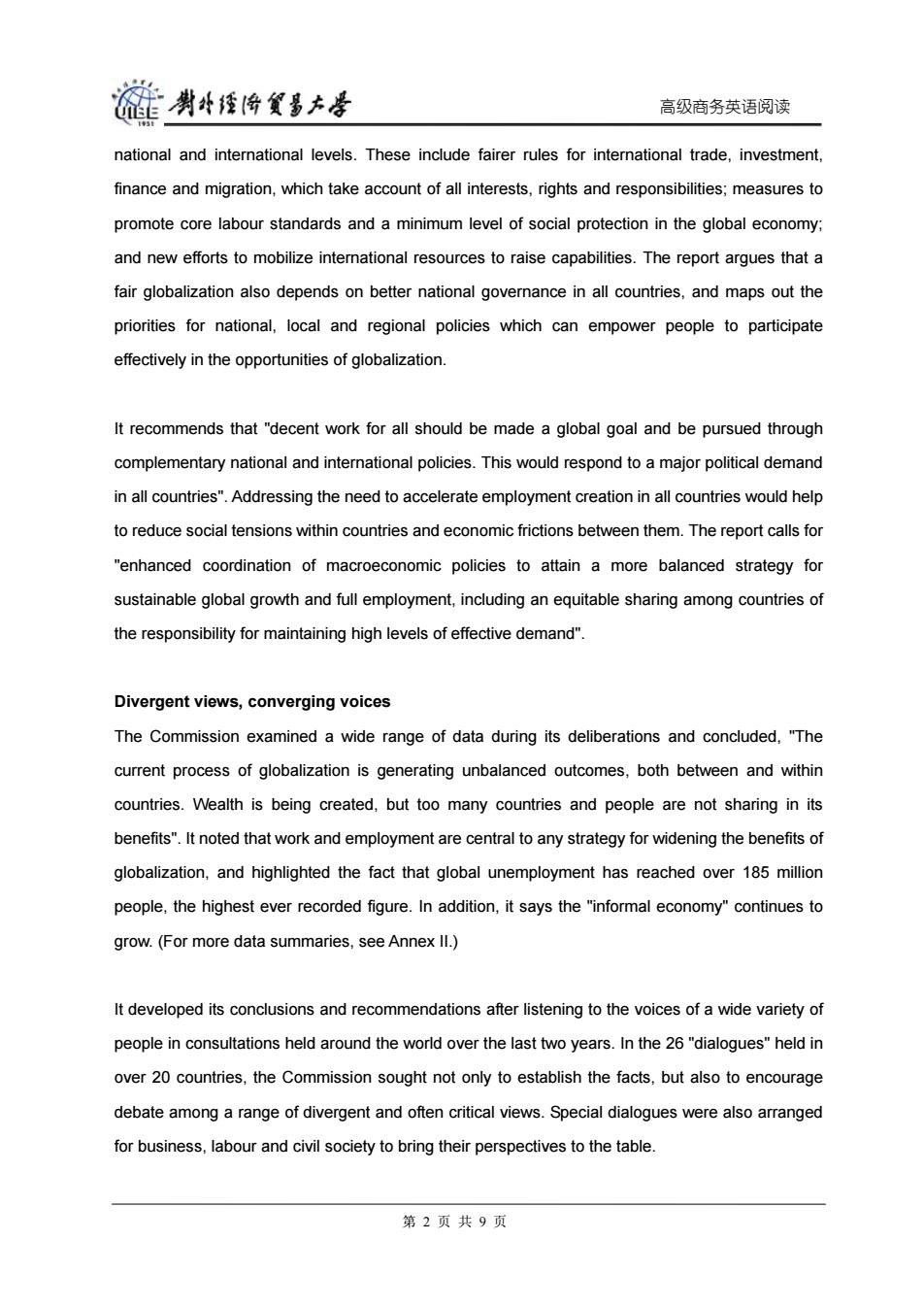
链剥挂将发多大是 高级商务英语阅读 national and international levels.These include fairer rules for international trade.investment. finance and migration,which take account of all interests,rights and responsibilities;measures to promote core labour standards and a minimum level of social protection in the global economy; and new efforts to mobilize international resources to raise capabilities.The report argues that a fair globalization also depends on better national governance in all countries,and maps out the priorities for national,local and regional policies which can empower people to participate effectively in the opportunities of globalization. It recommends that"decent work for all should be made a global goal and be pursued through complementary national and international policies.This would respond to a major political demand in all countries".Addressing the need to accelerate employment creation in all countries would help to reduce social tensions within countries and economic frictions between them.The report calls for "enhanced coordination of macroeconomic policies to attain a more balanced strategy for sustainable global growth and full employment,including an equitable sharing among countries of the responsibility for maintaining high levels of effective demand". Divergent views,converging voices The Commission examined a wide range of data during its deliberations and concluded,"The current process of globalization is generating unbalanced outcomes,both between and within countries.Wealth is being created,but too many countries and people are not sharing in its benefits".It noted that work and employment are central to any strategy for widening the benefits of globalization,and highlighted the fact that global unemployment has reached over 185 million people,the highest ever recorded figure.In addition,it says the "informal economy"continues to grow.(For more data summaries,see Annex ll.) It developed its conclusions and recommendations after listening to the voices of a wide variety of people in consultations held around the world over the last two years.In the 26"dialogues"held in over 20 countries,the Commission sought not only to establish the facts,but also to encourage debate among a range of divergent and often critical views.Special dialogues were also arranged for business,labour and civil society to bring their perspectives to the table. 第2页共9页
高级商务英语阅读 national and international levels. These include fairer rules for international trade, investment, finance and migration, which take account of all interests, rights and responsibilities; measures to promote core labour standards and a minimum level of social protection in the global economy; and new efforts to mobilize international resources to raise capabilities. The report argues that a fair globalization also depends on better national governance in all countries, and maps out the priorities for national, local and regional policies which can empower people to participate effectively in the opportunities of globalization. It recommends that "decent work for all should be made a global goal and be pursued through complementary national and international policies. This would respond to a major political demand in all countries". Addressing the need to accelerate employment creation in all countries would help to reduce social tensions within countries and economic frictions between them. The report calls for "enhanced coordination of macroeconomic policies to attain a more balanced strategy for sustainable global growth and full employment, including an equitable sharing among countries of the responsibility for maintaining high levels of effective demand". Divergent views, converging voices The Commission examined a wide range of data during its deliberations and concluded, "The current process of globalization is generating unbalanced outcomes, both between and within countries. Wealth is being created, but too many countries and people are not sharing in its benefits". It noted that work and employment are central to any strategy for widening the benefits of globalization, and highlighted the fact that global unemployment has reached over 185 million people, the highest ever recorded figure. In addition, it says the "informal economy" continues to grow. (For more data summaries, see Annex II.) It developed its conclusions and recommendations after listening to the voices of a wide variety of people in consultations held around the world over the last two years. In the 26 "dialogues" held in over 20 countries, the Commission sought not only to establish the facts, but also to encourage debate among a range of divergent and often critical views. Special dialogues were also arranged for business, labour and civil society to bring their perspectives to the table. 第 2 页 共 9 页
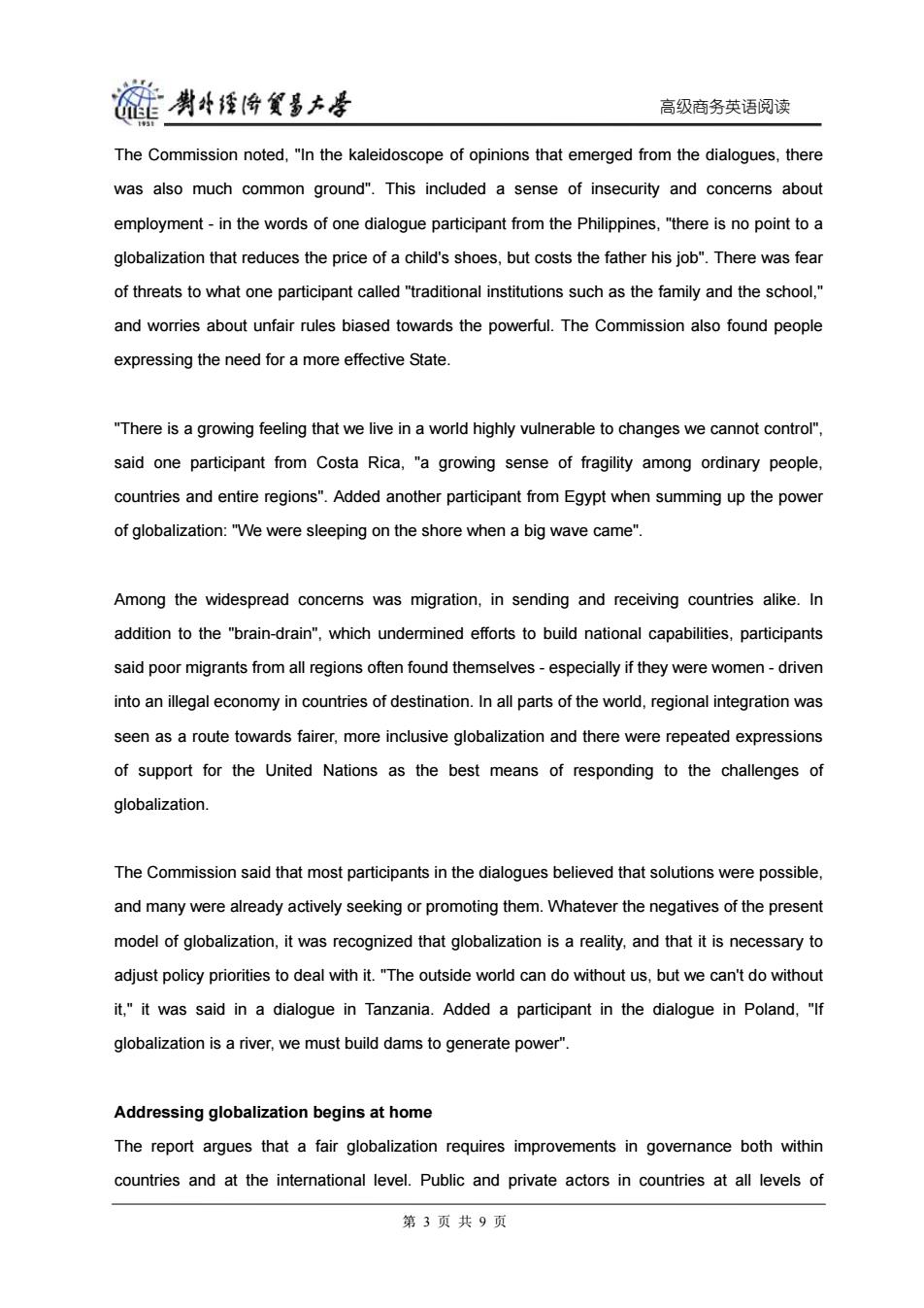
碰男华经海贸多大学 高级商务英语阅读 The Commission noted,"In the kaleidoscope of opinions that emerged from the dialogues,there was also much common ground".This included a sense of insecurity and concerns about employment-in the words of one dialogue participant from the Philippines,"there is no point to a globalization that reduces the price of a child's shoes,but costs the father his job".There was fear of threats to what one participant called "traditional institutions such as the family and the school," and worries about unfair rules biased towards the powerful.The Commission also found people expressing the need for a more effective State. "There is a growing feeling that we live in a world highly vulnerable to changes we cannot control", said one participant from Costa Rica,"a growing sense of fragility among ordinary people, countries and entire regions".Added another participant from Egypt when summing up the power of globalization:"We were sleeping on the shore when a big wave came". Among the widespread concemns was migration,in sending and receiving countries alike.In addition to the "brain-drain",which undermined efforts to build national capabilities,participants said poor migrants from all regions often found themselves-especially if they were women-driven into an illegal economy in countries of destination.In all parts of the world,regional integration was seen as a route towards fairer.more inclusive globalization and there were repeated expressions of support for the United Nations as the best means of responding to the challenges of globalization. The Commission said that most participants in the dialogues believed that solutions were possible, and many were already actively seeking or promoting them.Whatever the negatives of the present model of globalization,it was recognized that globalization is a reality,and that it is necessary to adjust policy priorities to deal with it."The outside world can do without us,but we can't do without it,"it was said in a dialogue in Tanzania.Added a participant in the dialogue in Poland,"If globalization is a river,we must build dams to generate power". Addressing globalization begins at home The report argues that a fair globalization requires improvements in governance both within countries and at the international level.Public and private actors in countries at all levels of 第3页共9页
高级商务英语阅读 The Commission noted, "In the kaleidoscope of opinions that emerged from the dialogues, there was also much common ground". This included a sense of insecurity and concerns about employment - in the words of one dialogue participant from the Philippines, "there is no point to a globalization that reduces the price of a child's shoes, but costs the father his job". There was fear of threats to what one participant called "traditional institutions such as the family and the school," and worries about unfair rules biased towards the powerful. The Commission also found people expressing the need for a more effective State. "There is a growing feeling that we live in a world highly vulnerable to changes we cannot control", said one participant from Costa Rica, "a growing sense of fragility among ordinary people, countries and entire regions". Added another participant from Egypt when summing up the power of globalization: "We were sleeping on the shore when a big wave came". Among the widespread concerns was migration, in sending and receiving countries alike. In addition to the "brain-drain", which undermined efforts to build national capabilities, participants said poor migrants from all regions often found themselves - especially if they were women - driven into an illegal economy in countries of destination. In all parts of the world, regional integration was seen as a route towards fairer, more inclusive globalization and there were repeated expressions of support for the United Nations as the best means of responding to the challenges of globalization. The Commission said that most participants in the dialogues believed that solutions were possible, and many were already actively seeking or promoting them. Whatever the negatives of the present model of globalization, it was recognized that globalization is a reality, and that it is necessary to adjust policy priorities to deal with it. "The outside world can do without us, but we can't do without it," it was said in a dialogue in Tanzania. Added a participant in the dialogue in Poland, "If globalization is a river, we must build dams to generate power". Addressing globalization begins at home The report argues that a fair globalization requires improvements in governance both within countries and at the international level. Public and private actors in countries at all levels of 第 3 页 共 9 页
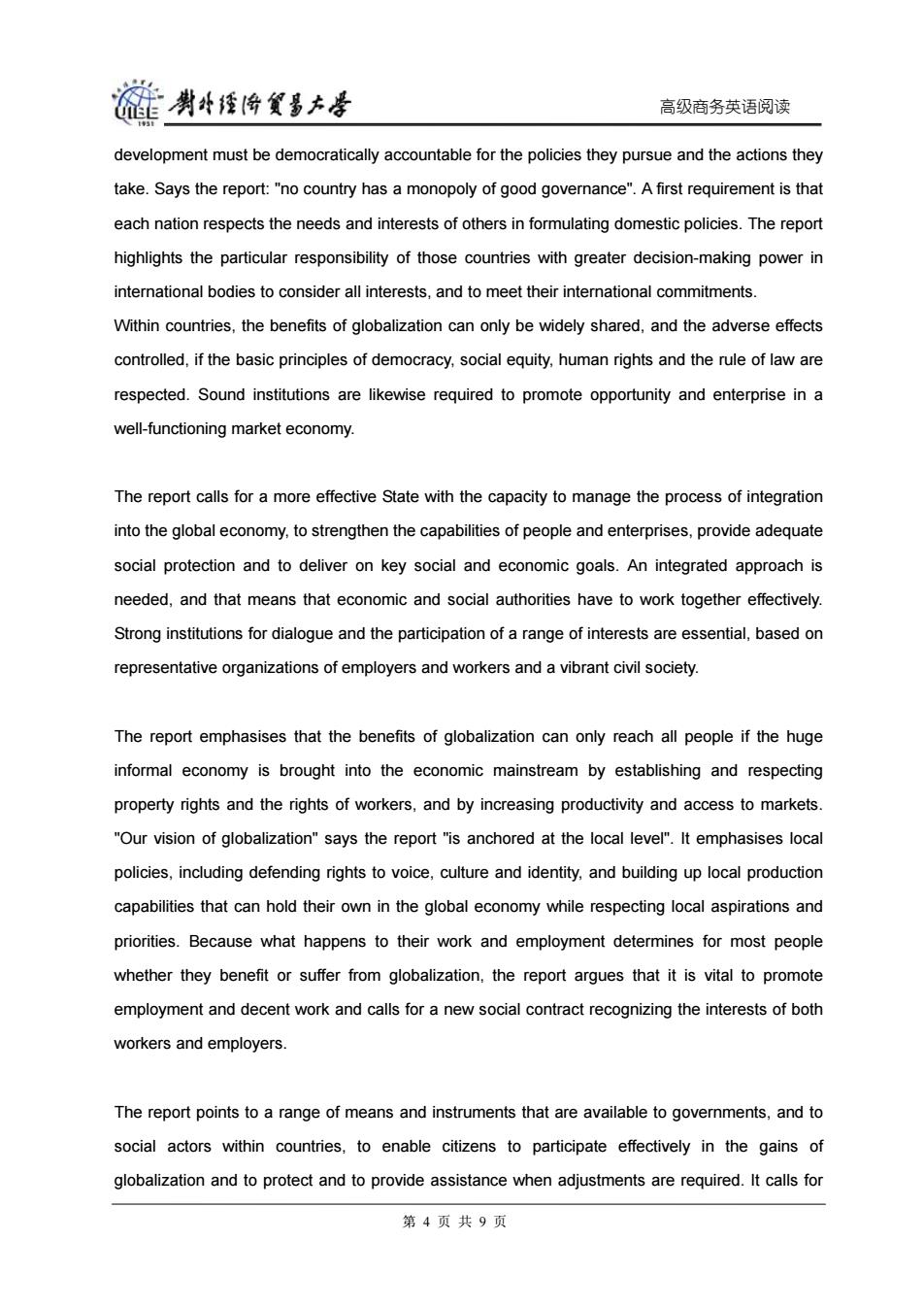
碰剥经悔贸昌大是 高级商务英语阅读 development must be democratically accountable for the policies they pursue and the actions they take.Says the report:"no country has a monopoly of good governance".A first requirement is that each nation respects the needs and interests of others in formulating domestic policies.The report highlights the particular responsibility of those countries with greater decision-making power in international bodies to consider all interests,and to meet their international commitments. Within countries,the benefits of globalization can only be widely shared,and the adverse effects controlled,if the basic principles of democracy,social equity,human rights and the rule of law are respected.Sound institutions are likewise required to promote opportunity and enterprise in a well-functioning market economy. The report calls for a more effective State with the capacity to manage the process of integration into the global economy,to strengthen the capabilities of people and enterprises,provide adequate social protection and to deliver on key social and economic goals.An integrated approach is needed,and that means that economic and social authorities have to work together effectively. Strong institutions for dialogue and the participation of a range of interests are essential,based on representative organizations of employers and workers and a vibrant civil society. The report emphasises that the benefits of globalization can only reach all people if the huge informal economy is brought into the economic mainstream by establishing and respecting property rights and the rights of workers,and by increasing productivity and access to markets. "Our vision of globalization"says the report"is anchored at the local level".It emphasises local policies,including defending rights to voice,culture and identity,and building up local production capabilities that can hold their own in the global economy while respecting local aspirations and priorities.Because what happens to their work and employment determines for most people whether they benefit or suffer from globalization,the report argues that it is vital to promote employment and decent work and calls for a new social contract recognizing the interests of both workers and employers. The report points to a range of means and instruments that are available to governments,and to social actors within countries,to enable citizens to participate effectively in the gains of globalization and to protect and to provide assistance when adjustments are required.It calls for 第4页共9页
高级商务英语阅读 development must be democratically accountable for the policies they pursue and the actions they take. Says the report: "no country has a monopoly of good governance". A first requirement is that each nation respects the needs and interests of others in formulating domestic policies. The report highlights the particular responsibility of those countries with greater decision-making power in international bodies to consider all interests, and to meet their international commitments. Within countries, the benefits of globalization can only be widely shared, and the adverse effects controlled, if the basic principles of democracy, social equity, human rights and the rule of law are respected. Sound institutions are likewise required to promote opportunity and enterprise in a well-functioning market economy. The report calls for a more effective State with the capacity to manage the process of integration into the global economy, to strengthen the capabilities of people and enterprises, provide adequate social protection and to deliver on key social and economic goals. An integrated approach is needed, and that means that economic and social authorities have to work together effectively. Strong institutions for dialogue and the participation of a range of interests are essential, based on representative organizations of employers and workers and a vibrant civil society. The report emphasises that the benefits of globalization can only reach all people if the huge informal economy is brought into the economic mainstream by establishing and respecting property rights and the rights of workers, and by increasing productivity and access to markets. "Our vision of globalization" says the report "is anchored at the local level". It emphasises local policies, including defending rights to voice, culture and identity, and building up local production capabilities that can hold their own in the global economy while respecting local aspirations and priorities. Because what happens to their work and employment determines for most people whether they benefit or suffer from globalization, the report argues that it is vital to promote employment and decent work and calls for a new social contract recognizing the interests of both workers and employers. The report points to a range of means and instruments that are available to governments, and to social actors within countries, to enable citizens to participate effectively in the gains of globalization and to protect and to provide assistance when adjustments are required. It calls for 第 4 页 共 9 页
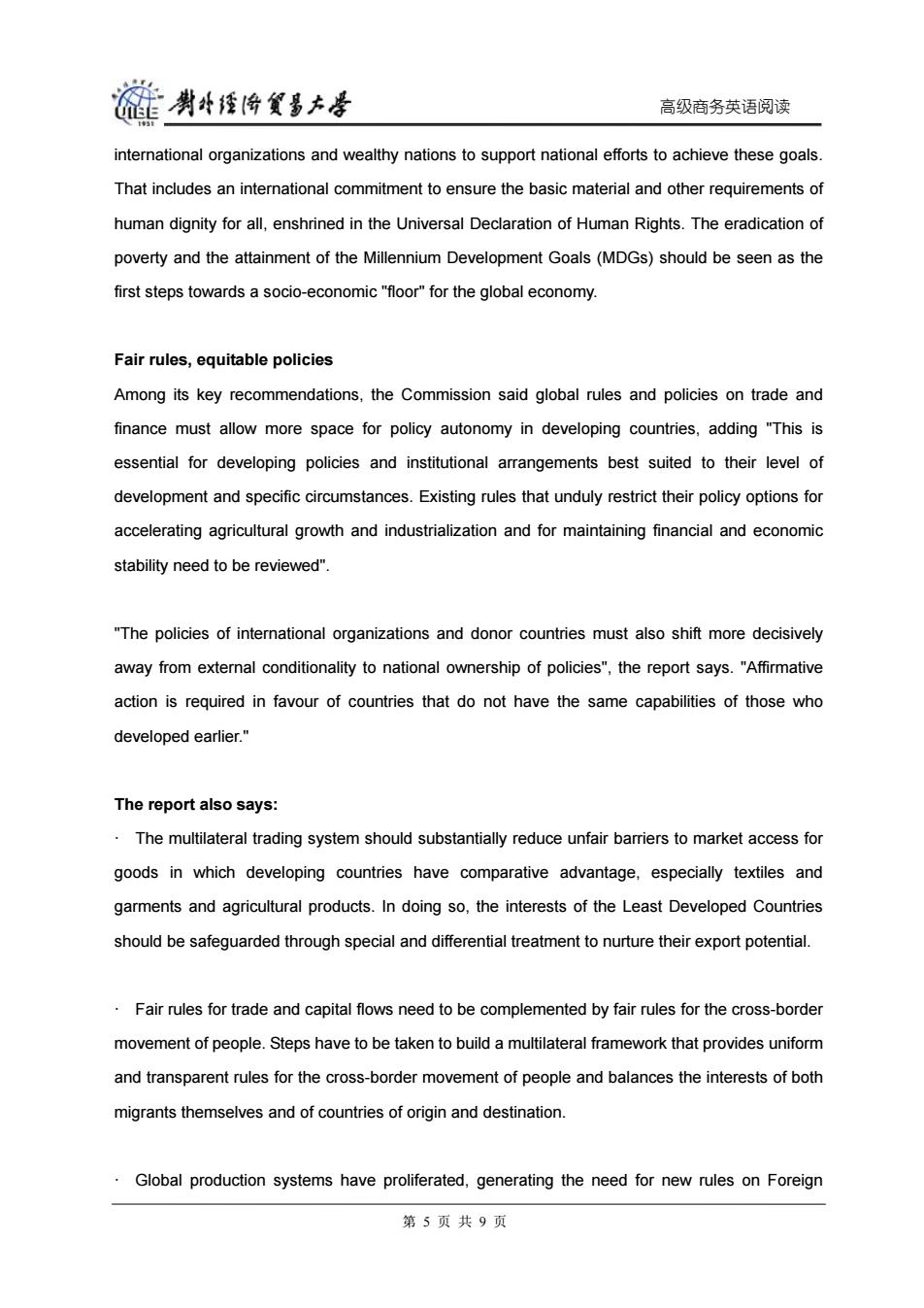
碰剥经悔贸昌大是 高级商务英语阅读 international organizations and wealthy nations to support national efforts to achieve these goals. That includes an international commitment to ensure the basic material and other requirements of human dignity for all,enshrined in the Universal Declaration of Human Rights.The eradication of poverty and the attainment of the Millennium Development Goals(MDGs)should be seen as the first steps towards a socio-economic "floor"for the global economy. Fair rules,equitable policies Among its key recommendations,the Commission said global rules and policies on trade and finance must allow more space for policy autonomy in developing countries,adding "This is essential for developing policies and institutional arrangements best suited to their level of development and specific circumstances.Existing rules that unduly restrict their policy options for accelerating agricultural growth and industrialization and for maintaining financial and economic stability need to be reviewed". "The policies of international organizations and donor countries must also shift more decisively away from external conditionality to national ownership of policies",the report says."Affirmative action is required in favour of countries that do not have the same capabilities of those who developed earlier." The report also says: The multilateral trading system should substantially reduce unfair barriers to market access for goods in which developing countries have comparative advantage,especially textiles and garments and agricultural products.In doing so,the interests of the Least Developed Countries should be safeguarded through special and differential treatment to nurture their export potential. Fair rules for trade and capital flows need to be complemented by fair rules for the cross-border movement of people.Steps have to be taken to build a multilateral framework that provides uniform and transparent rules for the cross-border movement of people and balances the interests of both migrants themselves and of countries of origin and destination. Global production systems have proliferated,generating the need for new rules on Foreign 第5页共9页
高级商务英语阅读 international organizations and wealthy nations to support national efforts to achieve these goals. That includes an international commitment to ensure the basic material and other requirements of human dignity for all, enshrined in the Universal Declaration of Human Rights. The eradication of poverty and the attainment of the Millennium Development Goals (MDGs) should be seen as the first steps towards a socio-economic "floor" for the global economy. Fair rules, equitable policies Among its key recommendations, the Commission said global rules and policies on trade and finance must allow more space for policy autonomy in developing countries, adding "This is essential for developing policies and institutional arrangements best suited to their level of development and specific circumstances. Existing rules that unduly restrict their policy options for accelerating agricultural growth and industrialization and for maintaining financial and economic stability need to be reviewed". "The policies of international organizations and donor countries must also shift more decisively away from external conditionality to national ownership of policies", the report says. "Affirmative action is required in favour of countries that do not have the same capabilities of those who developed earlier." The report also says: · The multilateral trading system should substantially reduce unfair barriers to market access for goods in which developing countries have comparative advantage, especially textiles and garments and agricultural products. In doing so, the interests of the Least Developed Countries should be safeguarded through special and differential treatment to nurture their export potential. · Fair rules for trade and capital flows need to be complemented by fair rules for the cross-border movement of people. Steps have to be taken to build a multilateral framework that provides uniform and transparent rules for the cross-border movement of people and balances the interests of both migrants themselves and of countries of origin and destination. · Global production systems have proliferated, generating the need for new rules on Foreign 第 5 页 共 9 页
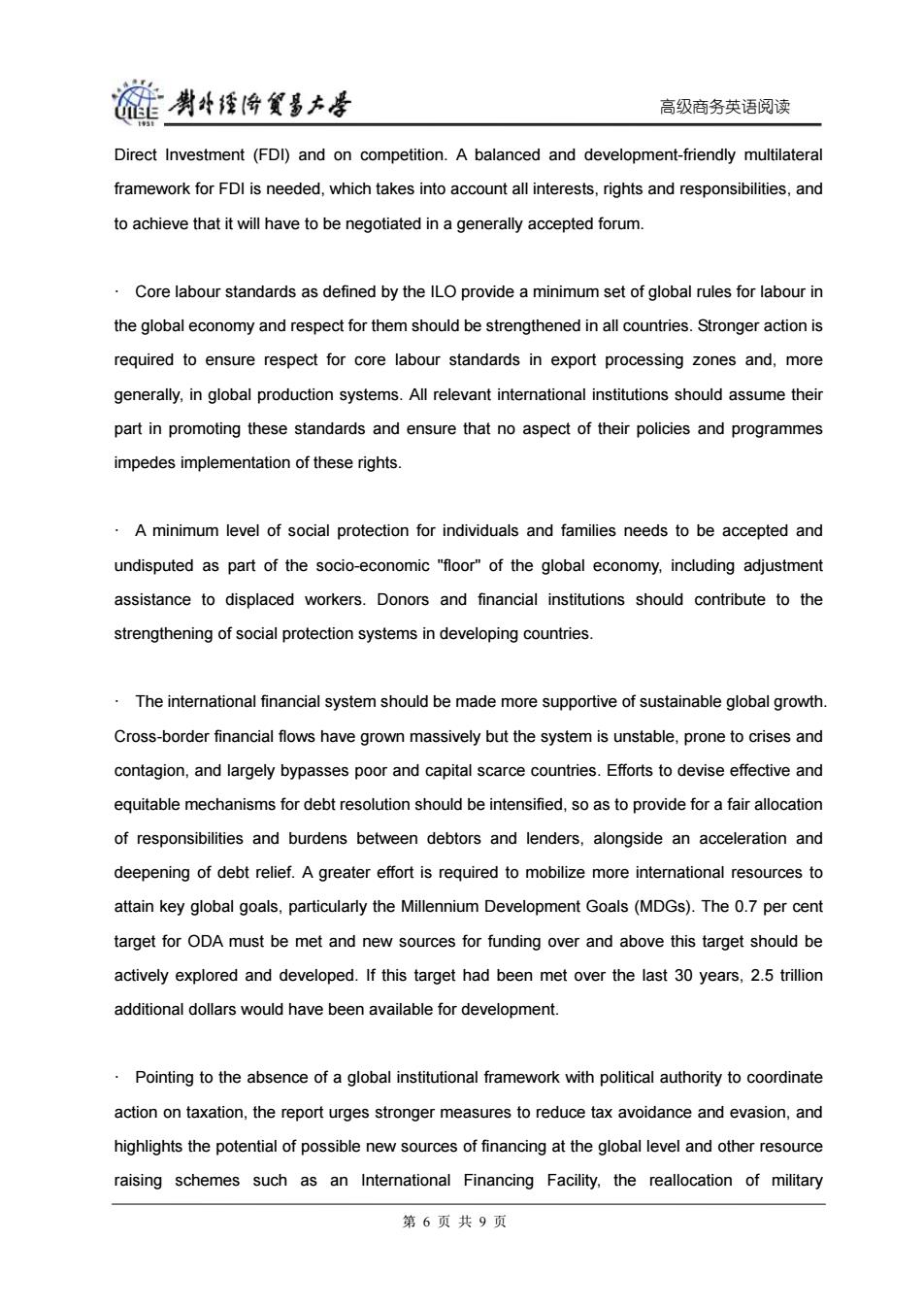
喇牛煙将多大是 高级商务英语阅读 Direct Investment (FDI)and on competition.A balanced and development-friendly multilateral framework for FDI is needed,which takes into account all interests,rights and responsibilities,and to achieve that it will have to be negotiated in a generally accepted forum. Core labour standards as defined by the ILO provide a minimum set of global rules for labour in the global economy and respect for them should be strengthened in all countries.Stronger action is required to ensure respect for core labour standards in export processing zones and,more generally,in global production systems.All relevant international institutions should assume their part in promoting these standards and ensure that no aspect of their policies and programmes impedes implementation of these rights. A minimum level of social protection for individuals and families needs to be accepted and undisputed as part of the socio-economic "floor"of the global economy,including adjustment assistance to displaced workers.Donors and financial institutions should contribute to the strengthening of social protection systems in developing countries. The international financial system should be made more supportive of sustainable global growth. Cross-border financial flows have grown massively but the system is unstable,prone to crises and contagion,and largely bypasses poor and capital scarce countries.Efforts to devise effective and equitable mechanisms for debt resolution should be intensified,so as to provide for a fair allocation of responsibilities and burdens between debtors and lenders,alongside an acceleration and deepening of debt relief.A greater effort is required to mobilize more international resources to attain key global goals,particularly the Millennium Development Goals(MDGs).The 0.7 per cent target for ODA must be met and new sources for funding over and above this target should be actively explored and developed.If this target had been met over the last 30 years,2.5 trillion additional dollars would have been available for development. Pointing to the absence of a global institutional framework with political authority to coordinate action on taxation,the report urges stronger measures to reduce tax avoidance and evasion,and highlights the potential of possible new sources of financing at the global level and other resource raising schemes such as an International Financing Facility,the reallocation of military 第6页共9页
高级商务英语阅读 Direct Investment (FDI) and on competition. A balanced and development-friendly multilateral framework for FDI is needed, which takes into account all interests, rights and responsibilities, and to achieve that it will have to be negotiated in a generally accepted forum. · Core labour standards as defined by the ILO provide a minimum set of global rules for labour in the global economy and respect for them should be strengthened in all countries. Stronger action is required to ensure respect for core labour standards in export processing zones and, more generally, in global production systems. All relevant international institutions should assume their part in promoting these standards and ensure that no aspect of their policies and programmes impedes implementation of these rights. · A minimum level of social protection for individuals and families needs to be accepted and undisputed as part of the socio-economic "floor" of the global economy, including adjustment assistance to displaced workers. Donors and financial institutions should contribute to the strengthening of social protection systems in developing countries. · The international financial system should be made more supportive of sustainable global growth. Cross-border financial flows have grown massively but the system is unstable, prone to crises and contagion, and largely bypasses poor and capital scarce countries. Efforts to devise effective and equitable mechanisms for debt resolution should be intensified, so as to provide for a fair allocation of responsibilities and burdens between debtors and lenders, alongside an acceleration and deepening of debt relief. A greater effort is required to mobilize more international resources to attain key global goals, particularly the Millennium Development Goals (MDGs). The 0.7 per cent target for ODA must be met and new sources for funding over and above this target should be actively explored and developed. If this target had been met over the last 30 years, 2.5 trillion additional dollars would have been available for development. · Pointing to the absence of a global institutional framework with political authority to coordinate action on taxation, the report urges stronger measures to reduce tax avoidance and evasion, and highlights the potential of possible new sources of financing at the global level and other resource raising schemes such as an International Financing Facility, the reallocation of military 第 6 页 共 9 页

碰男经降贸多大是 高级商务英语阅读 expenditures to development assistance,and private,voluntary efforts Reinforcing the multilateral system-Improving the quality of global governance "The implementation of reforms in international economic and social policy will require worldwide political support,the commitment of key global actors,and the strengthening of global institutions". the report says."The UN multilateral system constitutes the core of global governance and is uniquely equipped to spearhead the process of reform.For it to cope with the current and emerging challenges of globalization it has to enhance its effectiveness and improve the quality of its govemnance,especially with respect to democratic representation and decision-making, accountability to people,and policy coherence." Key recommendations in the report include a variety of measures to make the multilateral system, including the Bretton Woods institutions and the WTO,more democratic and accountable to people, in its decision-making procedures,mechanisms for independent evaluation,and through parliamentary scrutiny of international policies.The report recommends a global parliamentary group to develop integrated oversight of the major international organizations. At both national and international levels the report highlights the need for greater coherence between economic and social policies.That requires governments to take a more integrated view of global policies,and to address the social dimension of globalization more effectively in major bodies such as the G8 and Economic and Social Council of the United Nations (ECOSOC). An important proposal in the report is for"Policy Coherence Initiatives"which would engage the key international organizations in developing a common,integrated approach to key global concerns.The first of these would cover the issue of a global strategy for growth,investment and employment.The report notes "the roots of the problem of global policy coherence lie at the national level".The Commission calls on Heads of State and government to ensure that in international forums national representatives promote an integrated policy approach to economic and social matters. Making it happen-Buy-in of multiple stakeholders 第7页共9页
高级商务英语阅读 expenditures to development assistance, and private, voluntary efforts. Reinforcing the multilateral system - Improving the quality of global governance "The implementation of reforms in international economic and social policy will require worldwide political support, the commitment of key global actors, and the strengthening of global institutions", the report says. "The UN multilateral system constitutes the core of global governance and is uniquely equipped to spearhead the process of reform. For it to cope with the current and emerging challenges of globalization it has to enhance its effectiveness and improve the quality of its governance, especially with respect to democratic representation and decision-making, accountability to people, and policy coherence." Key recommendations in the report include a variety of measures to make the multilateral system, including the Bretton Woods institutions and the WTO, more democratic and accountable to people, in its decision-making procedures, mechanisms for independent evaluation, and through parliamentary scrutiny of international policies. The report recommends a global parliamentary group to develop integrated oversight of the major international organizations. At both national and international levels the report highlights the need for greater coherence between economic and social policies. That requires governments to take a more integrated view of global policies, and to address the social dimension of globalization more effectively in major bodies such as the G8 and Economic and Social Council of the United Nations (ECOSOC). An important proposal in the report is for "Policy Coherence Initiatives" which would engage the key international organizations in developing a common, integrated approach to key global concerns. The first of these would cover the issue of a global strategy for growth, investment and employment. The report notes "the roots of the problem of global policy coherence lie at the national level". The Commission calls on Heads of State and government to ensure that in international forums national representatives promote an integrated policy approach to economic and social matters. Making it happen - Buy-in of multiple stakeholders 第 7 页 共 9 页
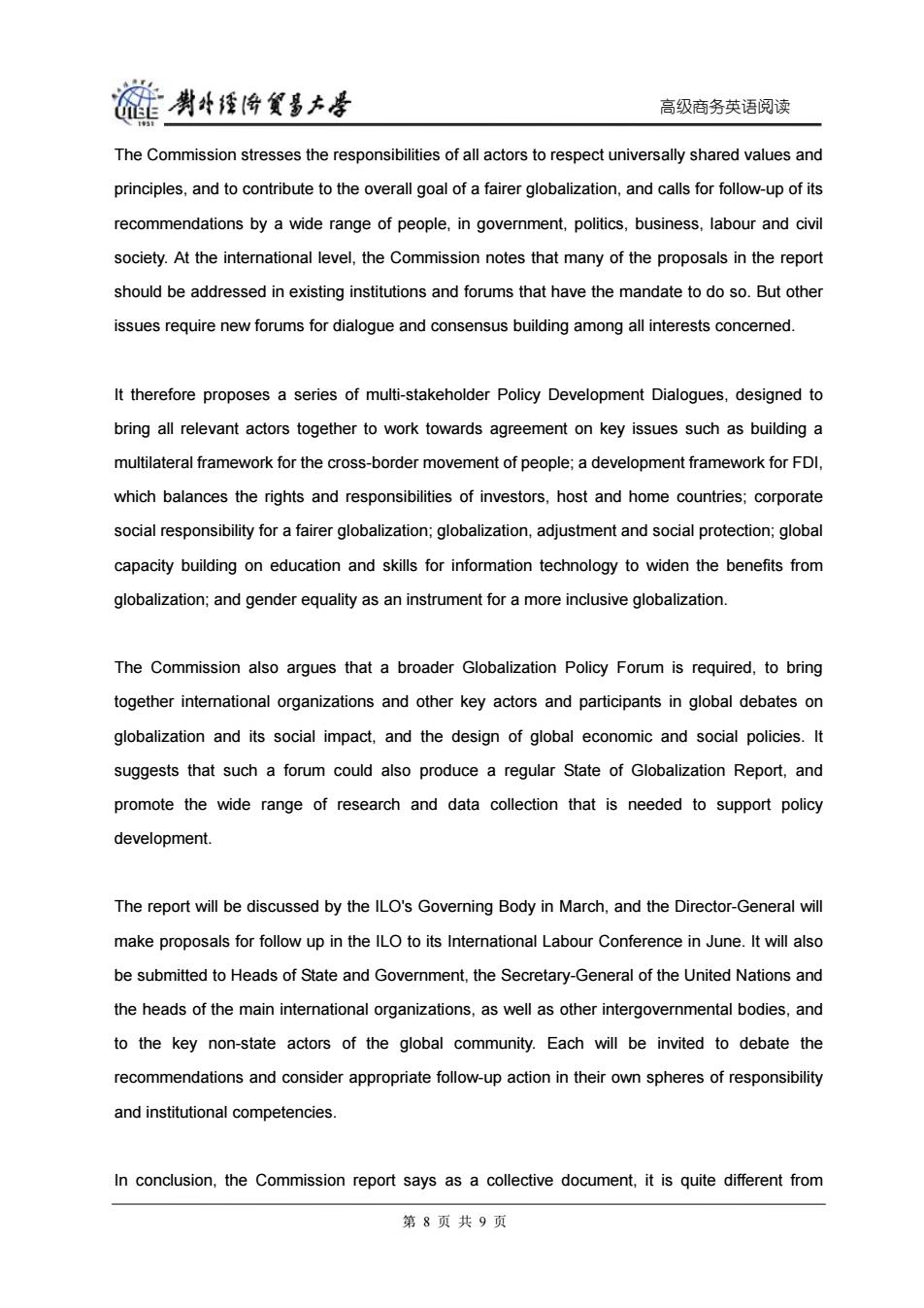
链潮4将置多大号 高级商务英语阅读 The Commission stresses the responsibilities of all actors to respect universally shared values and principles,and to contribute to the overall goal of a fairer globalization,and calls for follow-up of its recommendations by a wide range of people,in government,politics,business,labour and civil society.At the international level,the Commission notes that many of the proposals in the report should be addressed in existing institutions and forums that have the mandate to do so.But other issues require new forums for dialogue and consensus building among all interests concerned. It therefore proposes a series of multi-stakeholder Policy Development Dialogues,designed to bring all relevant actors together to work towards agreement on key issues such as building a multilateral framework for the cross-border movement of people;a development framework for FDI, which balances the rights and responsibilities of investors,host and home countries;corporate social responsibility for a fairer globalization;globalization,adjustment and social protection;global capacity building on education and skills for information technology to widen the benefits from globalization;and gender equality as an instrument for a more inclusive globalization. The Commission also argues that a broader Globalization Policy Forum is required,to bring together international organizations and other key actors and participants in global debates on globalization and its social impact,and the design of global economic and social policies.It suggests that such a forum could also produce a regular State of Globalization Report,and promote the wide range of research and data collection that is needed to support policy development. The report will be discussed by the ILO's Governing Body in March,and the Director-General will make proposals for follow up in the ILO to its International Labour Conference in June.It will also be submitted to Heads of State and Government,the Secretary-General of the United Nations and the heads of the main international organizations,as well as other intergovernmental bodies,and to the key non-state actors of the global community.Each will be invited to debate the recommendations and consider appropriate follow-up action in their own spheres of responsibility and institutional competencies. In conclusion,the Commission report says as a collective document,it is quite different from 第8页共9页
高级商务英语阅读 The Commission stresses the responsibilities of all actors to respect universally shared values and principles, and to contribute to the overall goal of a fairer globalization, and calls for follow-up of its recommendations by a wide range of people, in government, politics, business, labour and civil society. At the international level, the Commission notes that many of the proposals in the report should be addressed in existing institutions and forums that have the mandate to do so. But other issues require new forums for dialogue and consensus building among all interests concerned. It therefore proposes a series of multi-stakeholder Policy Development Dialogues, designed to bring all relevant actors together to work towards agreement on key issues such as building a multilateral framework for the cross-border movement of people; a development framework for FDI, which balances the rights and responsibilities of investors, host and home countries; corporate social responsibility for a fairer globalization; globalization, adjustment and social protection; global capacity building on education and skills for information technology to widen the benefits from globalization; and gender equality as an instrument for a more inclusive globalization. The Commission also argues that a broader Globalization Policy Forum is required, to bring together international organizations and other key actors and participants in global debates on globalization and its social impact, and the design of global economic and social policies. It suggests that such a forum could also produce a regular State of Globalization Report, and promote the wide range of research and data collection that is needed to support policy development. The report will be discussed by the ILO's Governing Body in March, and the Director-General will make proposals for follow up in the ILO to its International Labour Conference in June. It will also be submitted to Heads of State and Government, the Secretary-General of the United Nations and the heads of the main international organizations, as well as other intergovernmental bodies, and to the key non-state actors of the global community. Each will be invited to debate the recommendations and consider appropriate follow-up action in their own spheres of responsibility and institutional competencies. In conclusion, the Commission report says as a collective document, it is quite different from 第 8 页 共 9 页
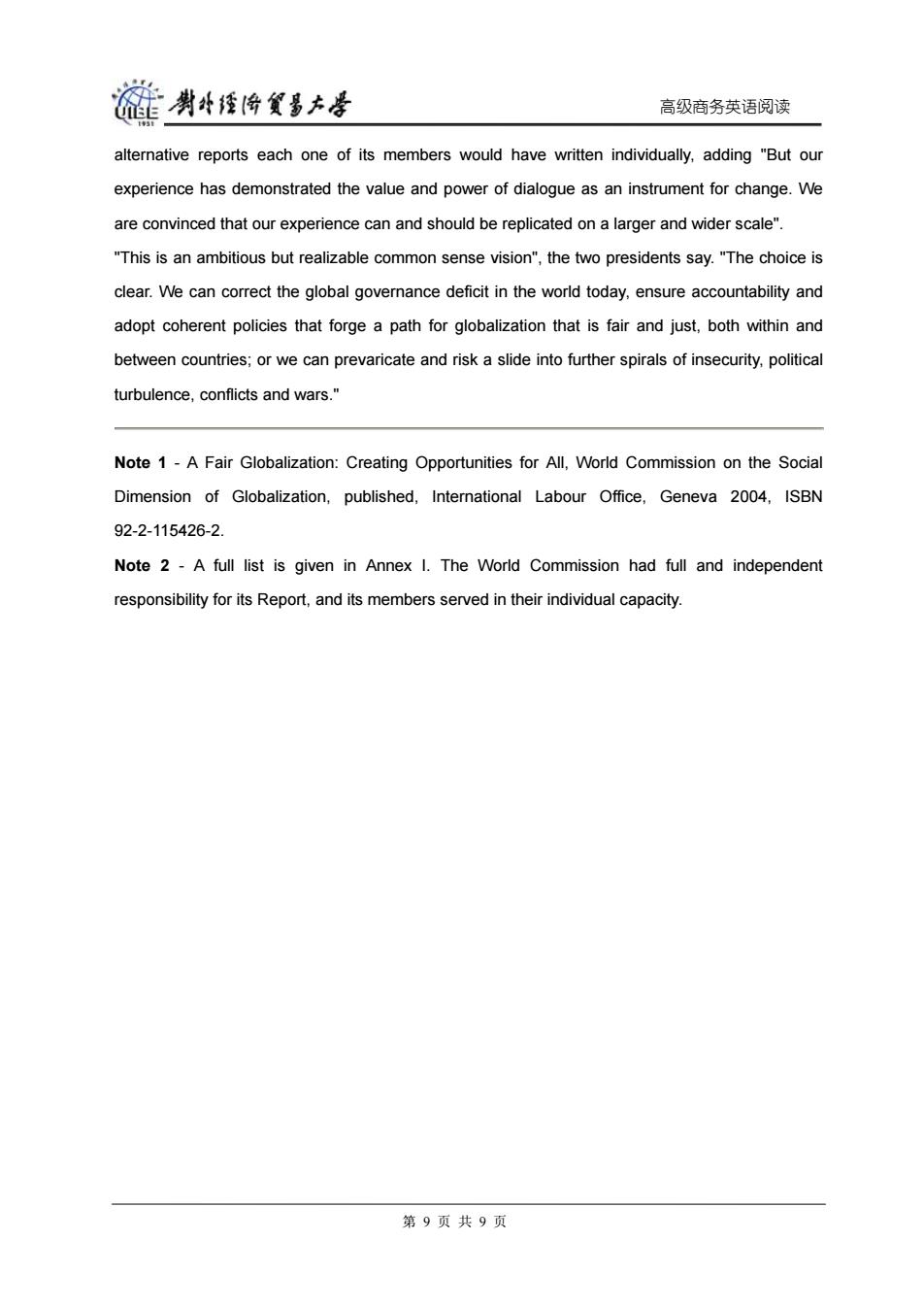
链黄科特倚食事大香 高级商务英语阅读 alternative reports each one of its members would have written individually,adding "But our experience has demonstrated the value and power of dialogue as an instrument for change.We are convinced that our experience can and should be replicated on a larger and wider scale". "This is an ambitious but realizable common sense vision",the two presidents say."The choice is clear.We can correct the global governance deficit in the world today,ensure accountability and adopt coherent policies that forge a path for globalization that is fair and just,both within and between countries;or we can prevaricate and risk a slide into further spirals of insecurity,political turbulence,conflicts and wars." Note 1-A Fair Globalization:Creating Opportunities for All,World Commission on the Social Dimension of Globalization,published,International Labour Office,Geneva 2004,ISBN 92-2-115426-2. Note 2 -A full list is given in Annex I.The World Commission had full and independent responsibility for its Report,and its members served in their individual capacity. 第9页共9页
高级商务英语阅读 alternative reports each one of its members would have written individually, adding "But our experience has demonstrated the value and power of dialogue as an instrument for change. We are convinced that our experience can and should be replicated on a larger and wider scale". "This is an ambitious but realizable common sense vision", the two presidents say. "The choice is clear. We can correct the global governance deficit in the world today, ensure accountability and adopt coherent policies that forge a path for globalization that is fair and just, both within and between countries; or we can prevaricate and risk a slide into further spirals of insecurity, political turbulence, conflicts and wars." Note 1 - A Fair Globalization: Creating Opportunities for All, World Commission on the Social Dimension of Globalization, published, International Labour Office, Geneva 2004, ISBN 92-2-115426-2. Note 2 - A full list is given in Annex I. The World Commission had full and independent responsibility for its Report, and its members served in their individual capacity. 第 9 页 共 9 页